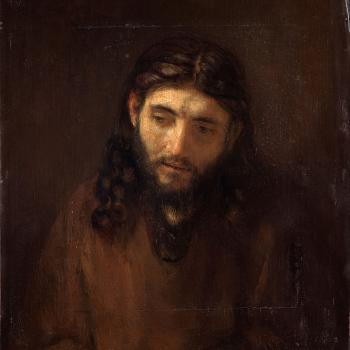After watching episodes 4-6 of season four last night at our local movie theater, I was persuaded that The Chosen is the best cinematic portrayal of Jesus and presentation of the gospel ever. And it is, in my subjective and fallible opinion, for several reasons:
*
1) Obviously with the amount of hours that a six-season series has, it can get into a depth with all the characters — including, I think most interestingly, Jesus Himself — that no movie about Jesus or the advent of Christianity ever has.
*
2) The whole point of it is to highlight the first followers of Jesus (“the chosen”). That had never been done before, either (excepting some films about St. Peter), and it’s a stroke of genius, because they are, in effect, us. Because of this focus, the role of Jesus was actually a supporting role for a few seasons, whereas now, at this stage, He is front and center.
*
3) It shows the humanness of Jesus (He was both God and man, after all) and what He went through. All other portrayals I have seen only deal with His anguish during physical persecution, excepting the Garden of Gethsemane. The Chosen — especially starting in this season 4, as the director stated at the beginning of it — shows the whole range of human emotion that Jesus feels, and what His disciples feel. It’s so well done that it actually allows the viewer to relate to what Jesus experienced on our behalf: to think His thoughts and feel His feelings, which is quite a remarkable thing: especially, I think, for those who are just starting to learn about Christianity.
*
4) It deals with topics like the problem of evil, which is the most difficult question concerning Christianity that we apologists have to deal with (and that most Christians grapple with emotionally and intellectually). It’s “real.” It doesn’t sugar-coat thorny issues.
*
5) As my wife said when we drove home, “it makes the disciples so human.” Indeed it does. We can relate to them, too, which has traditionally been difficult because we Christians have the benefit of hindsight and the indwelling of the Holy Spirit. It’s hard for us to comprehend how they could hardly understand Jesus at all. But they didn’t yet have the Holy Spirit or the sacraments. When they did, and when they saw the risen Jesus, and were with Him for forty days after He rose, it was a different story, and they went out and turned the world upside down, and ten of them were martyrs (all but John and Judas). He conquered death, just as He had said He would. What more proof was needed?
*
6) Because of these things and others, I believe this series will be the greatest cinematic evangelization effort and presentation of the gospel that there ever has been. It’ll touch more people and get them interested in Christianity and bring them to Jesus than any other such effort. The director and writer, Dallas Jenkins, knows how to produce great art and also what will be, I’m convinced, a uniquely profound and fruitful piece of evangelization; including even apologetics of a sort, in a roundabout way (why we believe what we do, and/or why we believe, even though it may be difficult to live and comprehend). He’s doing both things simultaneously, and in a flat-out brilliant and Spirit-soaked fashion. I can’t wait to see what else he produces in his directing career.
*
7) It works in the way that Jesus of Nazareth (which has been my favorite Christian / biblical movie these past 47 years) worked, but even better. That film reached into my heart and soul and made Jesus real, so that I could devote my life to Him shortly afterwards. That’s what good Bible-inspired drama can do. It was like being with Jesus in person. God used it in my life. He will use this movie to move the hearts and touch the spirits of many millions of people. Since I experienced that very thing, I think I can particularly relate to it happening to people as a result of watching this amazing series.
*
8) People can and will fight about The Chosen (since Christians insist on disagreeing about anything and everything, so that we can wreck our witness to the world). I think that’s a shame, because it’s reaching millions of hearts and bringing the gospel alive in a way that I’ve rarely seen happen in my 43 years as a practicing Christian and as an apologist. If we can’t see that and rejoice in it (because it’s evangelism as well as cinematic art), then we’re missing the forest for the trees and being like the Pharisees, who, by the way, are also excellently portrayed in this series. They majored on the minors, while people were being healed and having their lives transformed. If we quibble about this series and approach it the way the Pharisees approached Jesus, we’ll miss what God is doing through it, and we will have failed to see what is important and spiritually exciting.
*
9) The portrayal of Judas is done very well, incorporating some things we know from the Bible about what may very well have been a leading cause of his descent into unbelief and betrayal. I’ve never seen other movies about Jesus do this. And so once again the series is following the biblical lead as to Judas, and not speculating too much, in ways that are arguably contrary to what the Bible teaches us. Jesus of Nazareth made him out to be a political manipulator and virtually a Zealot (Jews who wanted to bring about a military uprising against the Romans). It’s the biggest fault of that movie, in my opinion. It’s going by what we know in the Bible and building upon it, with a high degree of plausibility, in my opinion. This is what we know about Judas:
*
John 12:3-6 (RSV) Mary took a pound of costly ointment of pure nard and anointed the feet of Jesus and wiped his feet with her hair; and the house was filled with the fragrance of the ointment. [4] But Judas Iscariot, one of his disciples (he who was to betray him), said, [5] “Why was this ointment not sold for three hundred denarii and given to the poor?” [6] This he said, not that he cared for the poor but because he was a thief, and as he had the money box he used to take what was put into it.
*
So the series is now constructing a plausible scenario of the development of Judas’ greed, pride, deepening sin and doubt, and eventual betrayal: showing how it could possibly have progressed from this tidbit of information that we know for sure, from inspired revelation. I think it’s great cinema and drama (as well as psychology). Understanding how sin progresses and gets worse over time is very valuable (Screwtape Letters-type stuff). There are all sorts of insights into human behavior throughout the film.
*
10) I’ve never seen the righteous indignation expressed towards the [corrupt individual] Pharisees portrayed as realistically as it is in this series, and in my opinion it was shown very much like I believe it actually was. There was a reason that prophets were killed, and why Jesus was murdered as well.
Jesus of Nazareth has that to an extent, and has a great turning-over-the-tables-of-the-moneychangers scene, but it wasn’t as intense or realistic, in my humble opinion.
*
11) As for theological mistakes (from a Catholic perspective), it’s true that the separate episode about Jesus’ birth didn’t present
Mary’s virginity in partu (i.e., a purely miraculous, non-painful birth different from the usual natural process). This is what Catholics and those who agree with us mean by “virginity
during birth”. Most Catholics (I highly suspect, maybe 90%) either don’t
know what that is or don’t
believe it, so do we really expect that an evangelical Protestant would? But it’s Catholic dogma, and
even Martin Luther believed in it. I’m not willing to dismiss the entire series because of one theological error. But I do wonder what the Catholic priest, who is one of three theological advisors, told Dallas about this doctrine. He may disbelieve it himself. Many Catholics do the same. I know, because I have defended it several times (search “
in partu” on my
Blessed Virgin Mary web page), and have heard the feedback.
*
12) On a personal note (referring back to #7 above), I think many people have a false perception that I am basically a “reason-only”-type person (sort of a Catholic Mr. Spock, minus the pointed ears). But I’m not at all (as my wife and kids could certainly verify). I agree with Chesterton’s observation about the madman: it isn’t that he has no reason, but that all he has is reason. The two big things that got me interested in evangelical Christianity and serious about God were 1) drama (Jesus of Nazareth) and 2) Bible prophecy (an area I have hardly ever written about as an apologist). That’s what God used to draw me in. Apologetics didn’t come into my life until four years later. I have emotions, feelings, an artistic sense, spiritual experiences, compassion, empathy, intuition, a great love of music (majored in it in high school), imagination, hopes and dreams and fears, and many other non-rational aspects that are all aspects of the whole person that is me.
*
Of course, I concentrate on reasoned arguments in my apologetics, and so it’s what people who haven’t met me see the most, but it doesn’t follow that that is all I am. I’m not some one-dimensional, one-sided caricature of what many people — for whatever reasons, good and bad — think an apologist is supposed to be like (sort of arrogant, intolerant, know-it-all, joyless stick-in-the-mud, etc.). I do think, however, that my writings reflect my outlook and approach as a person (not just an apologist), at least in places, if someone reads enough of them and gets beyond stereotypes of apologists, to see “behind” the words to my overall heart and soul and spirit.
*
*
***
*
Practical Matters: Perhaps some of my 4,500+ free online articles (the most comprehensive “one-stop” Catholic apologetics site) or fifty-five books have helped you (by God’s grace) to decide to become Catholic or to return to the Church, or better understand some doctrines and why we believe them.
Or you may believe my work is worthy to support for the purpose of apologetics and evangelism in general. If so, please seriously consider a much-needed financial contribution. I’m always in need of more funds: especially monthly support. “The laborer is worthy of his wages” (1 Tim 5:18, NKJV). 1 December 2021 was my 20th anniversary as a full-time Catholic apologist, and February 2022 marked the 25th anniversary of my blog.
PayPal donations are the easiest: just send to my email address: [email protected]. Here’s also a second page to get to PayPal. You’ll see the term “Catholic Used Book Service”, which is my old side-business. To learn about the different methods of contributing (including Zelle), see my page: About Catholic Apologist Dave Armstrong / Donation Information. Thanks a million from the bottom of my heart!
*
***
Photo credit: Simon Peter (Shahar Issac) and Andrew (Noah James) on the Sea of Galilee in episode 4 of Season 1 of The Chosen. [source] [Wikimedia Commons / Creative Commons Attribution-Share Alike 4.0 International license]
Summary: The Chosen: the Christian series directed and largely written by Dallas Jenkins, is, in my opinion, the best portrayal of Jesus & “cinematic evangelism” ever done.














